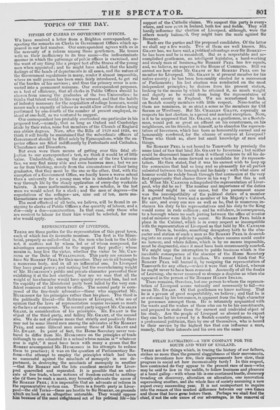STEAM NAVIGATION—A NEW COMPANY FOR. THE SOUTH AND WEST OF ENGLAND.
THERE are few things which, in tracing the history of our fathers, strikes us more than the general sluggishness of their movements, —their inventions how few, their improvements how slow, their progress in socialart how inconceivably tardy ! In this respect, how contrasted do they appear to the present race of men—whorn may be said to live in the saddle, to follow business and pleasure at a hand gallop—with whom life is one continued bustle, discovery treading on discovery, alteration on alteration, one innovation superseding another, and the whole face of society assuming a new aspect every succeeding year. It is not unimportant to, inquire into the reason of this marked differencebetweenour own times and those that have gotie _before them. Perhaps -we-shall find the chief, if not the sole cause of our advantages, in the removal of those difficulties which until within the 'last hall. century, or little; Inure, lay in the way of easy Communication bPjtween the men and
the minds of different kingdoms and different districts of the same
kingdom. While our fathers travelled at the rate of three miles, an hour, and while their ideas circuleked upon parchment, the
wisdom of the wise Coidd influence but few, and those only of their own little neighbourhbod. The art of printing, and the invention or revival rather of newspapers, waa a mighty step ; and yet of what value were books or iournah without the means of ready
transmission ? At length the mail-coach came in aid of the diffusion of knowledge, and PALMER completed the good that FAUST had begun. But the power of which PALMER took advantage had
its natural limits. When we had driven our horses to nine or ten miles an hour, their utmost speed was exhausted. Here, then, we seemed destined to stop. But the wheels of art and of science had
not been whirling so long in vain. GURNEY p.nd BRAITHWAITE stepped forward with a new power to accomplish what the animals
of Arabia could not ; and now the steam-carriage mocks the lag ging mail, as the mail was wont to mock the tardiness of the cumbrous vehicles which it superseded. By this last invention, when it becomes general—and general in the course of a few years it will unquestionably be—the scattered communities of England will be collected, as it were, into one district ; a circle of thirty miles diameter will be virtually contracted into one of ten ; and the remote and feeble sympathiea of citizenship will be exchanged for the kindly feelings of neighbourhood. Such are the improvements in communication by land. By sea the progress has hitherto been slower. From the nature of the
impelling power, and its natural fickleness, it seems to have been for many centuries concluded that improvement was hardly called for—the clumsiest vessel would reach its port with a fair wind, while the most admirably-constructed would hardly reach it without. In the shape of our vessels there has been little alteration for several centuries ; and down to the improvements of SEPPINGS, their construction was but a modified and enlarged copy of the wicker coracles of two thousand years ago. Here the introduction of a new power was even more strongly called for than in land machines;' and its introduction has been attended with even more important results. The first vessel impelled by wheels moved by steam, is not at this moment above eighteen years old ; and already the communication between London and Cork, and London and Aberdeen, is performed with certainty and despatch by the application of the same beautiful principle. The maritime towns of the Continent are connected with our own, the different ports on our own shores are connected with one another, by what may be called an endless chain—the communication from point to point is maintained with unvarying certainty and uninterrupted regularity.
Still, the range of steam navigation is extremely limited compared to the advantages it is calculated to bestow, and to the demands of the community. There are more than four hundred vessels in Great Britain ; but by far the greater number are con
ned to internal rivers, where in a short time they will be superseded by railways and steam-coaches. The longest voyages yet meditated extend only to the Mediterranean. Many portions of our own shores are wholly without such an accommodation. It is a curious and an instructive fact, that while Dublin sends fresh mutton to Manchester, and Covent Garden supplies the tables of the Edinburgh gentry with green pease, the apples of the Devonshire farmer must rot in the orchard for want of the means of transport to those quarters where they would be hailed as a dainty. With America no regular communication by steam has yet been attempted. Vessels come every week from New York in twenty, eighteen, sixteen days, while the average of the westward voyage exceeds six weeks: how vast would be the advantages were the time occupied in the voyage out and home to be equalized, which it easily might be, by the employment of steam-vessels constructed on accurate principles! Hitherto the chief, almost the only use of steam navigation, has been the conveyance of passengers ; and were they capable of nothing else, they would still be invaluable on that account : but, by the employment of the same description of engines afloat which are applied to the propelling of carriages ashore, the space hitherto occupied by machinery and fuel may be so greatly contracted, that even the heaviest goods will soon be conveyed with a profit superior to what the same carriage affords in sailing vessels.
We have been led to these speculations, at the present moment, by a prospectus of a new Steam Company, which has just been put into our hands, the outline of which we have much pleasure in presenting to our readers. It is to be called "The South and West of England Steam Navigation Company ;" but its operations will not be limited to home navigation, though they will be directed to that in the first instance. The primary object of the Company is to bring the mineral stores of South Wales, its iron, copper, and yet more especially its admirable coal, into the markets from the Land's End to London. At present the grand difficulty which the Swansea and other traders experience, is in doubling the Land's End. The delays and dangers and loss of lives in this navigation, are so great, that it was some time ago in contemplation to cut a canal across the eountry by way of remedying them. The plan contemplated by the Company, of establishing a chain of tugs; will be far cheaper both to the vessels and the public, and equally effectual By the establishment of large steam-vessels, the whole of the south coast .of Ireland may be made to contribute to the supply of Londonrand the numerous ports in the Channel, while it will receive from Wales the coals essential to its industry. We need not say that it is to the establishment of manufactures alone that Ireland can hope for the absorption of the superfluity of its agricultural population, and that by no other safe process can England be saved from the injury of their continued influx. The Company contemplate commercial advantages only, but they will realize moral advantages also. The third line in which they mean to operate is the Peninsula and the Mediterranean. Vessels, we have said, have proceeded to the Mediterranean occasionally ; to the Peninsula they used to go permanently, until FERDINAND entreated them to desist, for fear that the Times should set fire to
• Cadiz, if by any chance it could insinuate itself within the walls. The Mediterranean opens a large field for steam navigation; Marseilles, Toulon, Genoa, Leghorn, Naples, on the one side, and the whole of the Barbary ports on the other side, are open to the projectors ; and should they be met by a company in India, they may easily extend their trips to the Cataracts. The fourth line contemplated is from Liverpool to New York:; the extreme importance of which we have already adverted to. The Company's capital is half a million—in five thousand 100/. shares. From the prospectus we learn that the most enlightened improvements in the construction both of vessels and engines will be adopted.
"The vessels of this Company will be all constructed on the most improved principles, and by the most skilful builders. The Company entertain a confident expectation that they will be distinguished beyond any other steam-vessels known to the British Seas, for speed, safety, and comfort. For the first time in steam-vessels, the nuisance of foul smoke will be entirely removed; there will, in fact, be no smoke, amino chimney. On railroads this evil has been already done away with, in obedience to a positive injunction of the Legislature; but, strange to say, it still prevails universally on board steam-ships. The boilers will be smaller by threefourths, and lighter by two-thirds' than any of equal power ever used, and the quantity of fuel requisite to work them, not one-half what engines on the old construction require ; from which two causes more room will be obtained for the accommodation of passengers and goods than has ever been known before on board steam-ships, the heat will be much less annoying, and the expense of conveyance be also greatly reduced. In consequence too of the removal of the chimney, and the diminution in the bulk of the machinery, the motion of the vessel will be rendered smoother, steadier, and more equable than at present."
There is but one point on which we think differently from the projectors. They say— "Care will also betaken to select for the commanders of the Company's vessels, persons of the most approved and tried skill in the science of navigation ; and, since the time cannot be far distant when the agency of steam will be extensively employed for purposes of aural defence, as in the more peaceful pursuits of commerce, it is intended to make the selection as much as possible from unemployed naval officers, among whom, hitherto, the navigation of steam-ships has been treated as a subject of minor importance in naval tactics."
The choice of naval officers is judicious—they are not only sailors, but for the most part gentlemen, which captains of merchantmen, from their defective education, very seldom are: but so far are we from anticipating any extensive employment of steamvessels in naval warfare, that we look on their extensive employment, by bringing home to the remotest comers equally with the nearest the grand advantages of peaceful intercourse, as a means of banishing, in a very short time, national war from the earth We need hardly add in conclusion, that we heartily wish well to this splendid undertaking, as one which purposes to effect great good by wise and considerate means. We have heard that it will probably have the patronage of the King : it is a project which will reflect honour on his patronage.



























 Previous page
Previous page